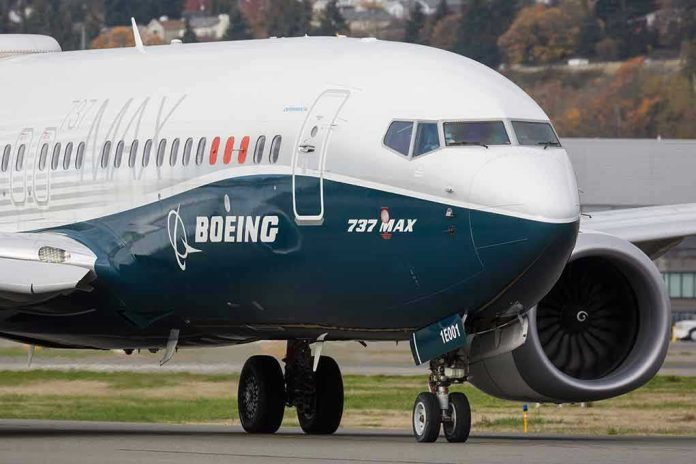
Boeing just absorbed a staggering $4.9 billion financial blow that pushes the 777X aircraft program seven years behind schedule, marking one of the most expensive development disasters in aviation history.
Story Snapshot
- Boeing takes $4.9 billion pre-tax charge on 777X program in Q3 2025, exceeding analyst expectations
- First deliveries of the flagship widebody aircraft pushed to 2027, marking the sixth major delay since 2013
- Total program cost overruns now exceed $15 billion due to certification challenges and regulatory hurdles
- FAA continues rigorous oversight following 737 MAX crisis, creating additional certification complexity
The Financial Catastrophe Unfolds
Boeing’s third-quarter earnings revealed the aerospace giant absorbed a $4.9 billion pre-tax charge for its troubled 777X program, pushing the company’s quarterly loss to $7.14 per share. The charge caught analysts off guard, exceeding their expectations and demonstrating the program’s spiraling costs. CEO Kelly Ortberg announced first deliveries would slip to 2027, adding two more years to an already delayed timeline.
The financial hit represents Boeing’s attempt to clear the decks of legacy problems while working toward operational recovery. Despite the massive loss, the company reported positive operating cash flow and increased commercial aircraft deliveries, suggesting some stability in other areas of the business.
Seven Years of Broken Promises
The 777X program launched in 2013 with ambitious promises of 2020 deliveries. The advanced widebody aircraft features revolutionary GE9X engines and innovative folding wingtips designed to compete with Airbus’s A350. However, technical challenges with the engine design, wing structure complications, and supply chain disruptions from COVID-19 derailed the original schedule.
FAA scrutiny intensified after the 737 MAX crisis, with regulators identifying “design maturity” issues and an uncontrolled pitching event during a 2020 test flight. The agency’s heightened caution reflects its determination to avoid another safety catastrophe that could damage both Boeing and the FAA’s credibility.
Industry Ripple Effects Spread
Major airlines including Lufthansa, Emirates, and Qatar Airways face fleet planning disruptions as they wait for aircraft originally promised years ago. These carriers ordered the 777X to replace aging widebody fleets and improve fuel efficiency on long-haul routes. The delays force airlines to extend leases on older, less efficient aircraft or consider Airbus alternatives.
Boeing’s supplier network also suffers from the extended timeline. GE Aviation continues producing engines for a program generating no revenue, while other suppliers must adjust production schedules and workforce planning. The delays create a cascade effect throughout the aerospace supply chain, affecting thousands of jobs and billions in potential economic activity.
Recovery Strategy Tests Leadership
Ortberg’s decision to absorb the full $4.9 billion charge in one quarter represents a strategic gamble to eliminate future financial surprises. Industry analysts view this approach as necessary transparency after years of incremental bad news from Boeing programs. The company hopes this financial housecleaning will restore investor confidence and provide a foundation for future growth.
Boeing’s ability to recover depends on successfully navigating remaining certification challenges while preventing further schedule slips. The company must balance regulatory compliance with commercial pressures from customers who have already waited years longer than promised. Success requires rebuilding trust with regulators, customers, and investors simultaneously—a challenge that will define Boeing’s next chapter in commercial aviation.
Sources:
AeroTime – Boeing takes 4.9B charge Q3 earnings 777x delays
Jalopnik – Boeing 777x delays cost 5 billion dollars
AVweb – Boeing pushes 777x to 2027 takes big loss
Boeing – Boeing Reports Third Quarter Results
Boeing Investors – Boeing Reports Third Quarter Results













